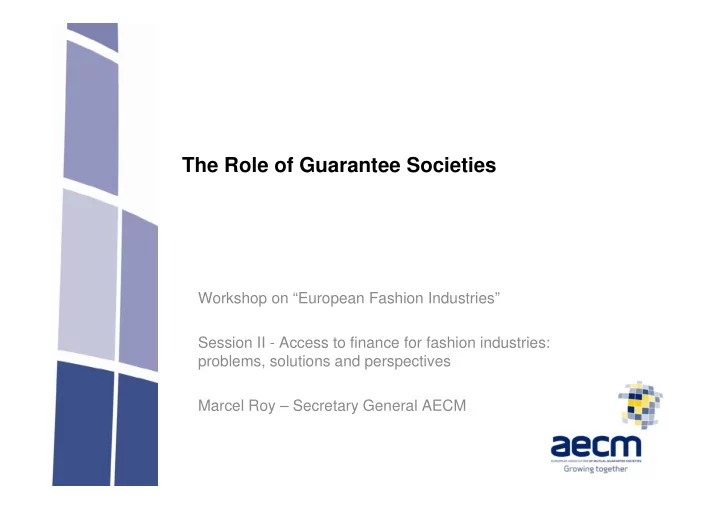

The Role of Guarantee Societies Workshop on “European Fashion Industries” Session II - Access to finance for fashion industries: problems, solutions and perspectives Marcel Roy – Secretary General AECM
Some figures about AECM AECM Membership 37 guarantee systems in 22 countries AECM key figures (31.12.2011, provisional) – Own funds € 9,4 billion – Guarantees issued in 2010 € 27,6 billion – Guarantees in portfolio € 83,7 billion – Multiplier effect ~ 9 x – Beneficiary SMEs 2,7 million
Why guarantees ? • Credit finance is important to SME in the EU, as they • Have no or little access to venture capital, mezzanine capital, bond issues, etc • Have weak own funds positions => limited capability to auto-finance investment or working capital needs • Rely predominantly on loan finance • Usually have a relative lack of bankable collateral ⇒ Risk of unrealized GDP and employment growth AECM members facilitate access to finance by providing credit • default guarantees for SME that: • Are economically healthy • Have an economically meaningful project but at the same time do not dispose of sufficient collateral to access bank credit
What are guarantees ? • Main aspects of the Guarantee instrument • Risk sharing agreement between the bank and guarantee institution: • Bank has a promising investment proposal but cannot grant the loan for lack of collateral • Guarantee institution issues guarantee to substitute missing collateral (up to a maximum of 80% of the loan amount) • The banks remains responsible for at least 20% of the loan • In case of default, the guarantee institution pays the bank the agreed share of the outstanding loan amount on first demand • Additionality: Only operations that the bank could not do on its own - Banks are encouraged to lend
What types guarantees exist ? • Generally: Credit default guarantees for SMEs: • Offered for all stages of SME life-cycle (Start- up – Transfer) • But also other types of guarantee products offered by some Guarantee schemes: • Guarantees for: » Micro loans, leasing, factoring, mezzanine finance, risk capital, internationalization, projects, EU funding, etc. » All sectors, fashion industry included
How to apply ? • Usually: Bank is distribution channel for guarantee: • SME customer submits loan application to bank • Bank submits demand for guarantee to the guarantee scheme • Guarantee scheme performs own (qualitative) analysis => upon positive decision, issues guarantee to bank on behalf of SME customer • Guarantee fee and processing fee paid by SME
Guarantees and SME support policy • Guarantee schemes’ philosophy : “Help for self-help” principle – non-profit orientation • Important element of public support policy • Regardless of whether they are private or public, guarantee schemes function as a transmission chain of SME policy • Therefore, they usually benefit from public support via counterguarantees • The guarantee , a highly efficient tool: • Revolving instrument • High multiplier effect of public resources • Guarantee volume in portfolio of 9 x own funds • Multiplier effect of the public counterguarantee
Evolution of guarantee volumes Progression of guarantee activity 2002 - 2009 80,000,000 70,000,000 60,000,000 in '000 € 50,000,000 Own funds 40,000,000 Value of guarantees granted during year Total value of guarantees in portfolio 30,000,000 20,000,000 10,000,000 0 2002 2003 2004 2005 2006 2007 2008 2009 Years
Justification for Guarantee support • Crisis or no crisis, there is a continued need for guarantees: • Overreliance of SME on loan finance – disadvantages in relation to larger companies • Market failure for SME access to finance exist all over the EU, independent of business cycle and relative economic development of the market • Rising interest rates and more selectivity to be expected: – Basel III implementation – Banks are already adapting to regulation and sovereign debt crisis by tightening credit conditions
Contact: AECM Rue Washington 40 1050 Brussels Belgium Tel/Fax: 00 32 / 2 640 51 77 E-mail: info@aecm.be Website: www.aecm.be
Recommend
More recommend